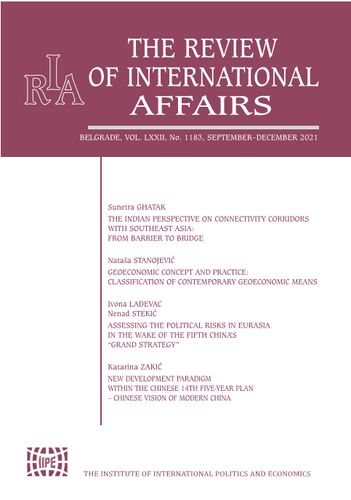Assessing the political risks in Eurasia in the wake of the fifth China's ''grand strategy''
Assessing the political risks in Eurasia in the wake of the fifth China's ''grand strategy''
Author(s): Ivona Lađevac, Nenad StekićSubject(s): International relations/trade, Security and defense, Peace and Conflict Studies
Published by: Институт за међународну политику и привреду
Keywords: political risks; foreign policy; China; Belt & Road Initiative; Grand Strategy; Big Data
Summary/Abstract: Political risk assessment (PRA) is usually performed at the national polity level. With a novel and globally significant reality exposed in the Belt and Road Initiative, the vast Eurasian space has risen high on the political risk assessment agenda. This has especially become dominant in Western academic narratives. How the various PRAs find their place in practice is an issue that constitutes a significant scientific void. This study aims to supplement such vivid endeavours by reviewing the current state of research and applying its findings to three regions: China’s geographical neighbourhood, Southeast and Central Europe, and Central Asia and the Middle East. Firstly, the findings of several major studies into the fifth so-called “Grand Strategy” of the People’s Republic of China as a major driver of its security policy will be contextualized. This will be followed by two segments, one which will stress the rudiments of PRA both in terms of the geographical realm and the modus operandi of the process. The second segment is devoted to contemporary scientific endeavours that include Big Data and deployment of artificial intelligence tools to determine the level and nature of political risk across the BRI space. After the findings are systematized, their implications for the BRI countries in the wake of the latest challenges will be underlined, such as the investment critiques and the decline in euphoria about the format “17+1”. The results demonstrate a significant change in the components of political risk for most of the Eurasian countries, which will consequently influence the process of reformulation of China’s foreign and security policy preferences.
Journal: The Review of International Affairs
- Issue Year: LXXII/2021
- Issue No: 1183
- Page Range: 47-66
- Page Count: 20
- Language: English

